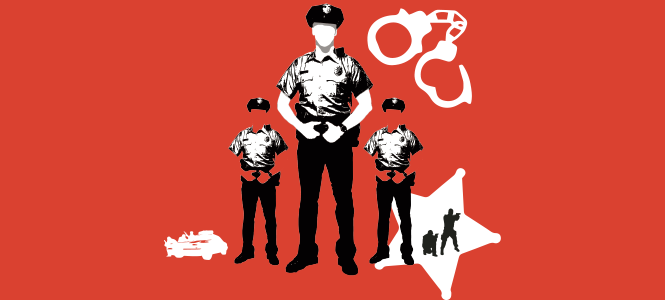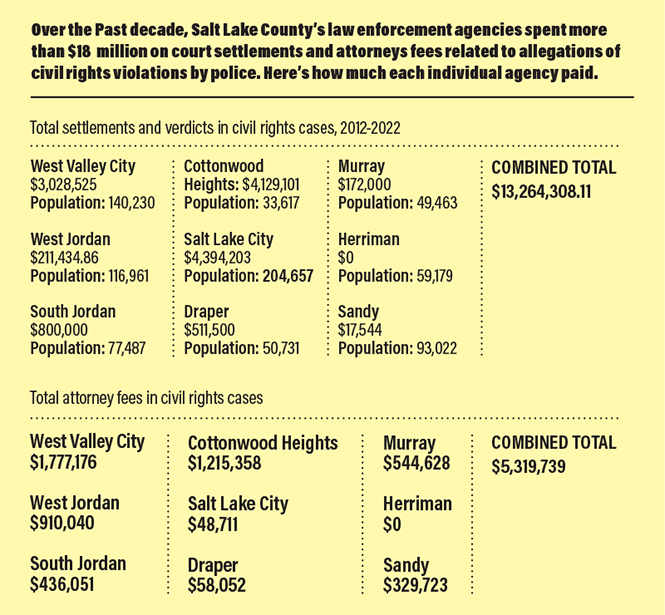Police departments in Salt Lake County spent almost $20 million on civil rights complaints in the past decade
The Co$t of Mi$conduct
By Eric S. Peterson @ericspeterson, Kim Bojórquez and Erin AlbertyThe following was reported by The Utah Investigative Journalism Project and Axios Salt Lake City, in partnership with Salt Lake City Weekly.
Adrian Govan had just stepped out of his grandmother's house on Memorial Day 2015, when he saw the Salt Lake City Police patrol car cruise past and double back toward him.
"That's when the harassment started," Govan recalled.
Govan and his grandmother were on their way to put flowers on a relative's grave. He admits he was parked illegally, but he was hoping to quickly pick up his grandmother and head out.
When he told the officer he would move as soon as his grandmother was with him, he said that it was like a "switch was flipped" with the officer.
"He was like, 'Oh you're racist, you don't like me because of my badge?'" Govan recalled. It was a confusing accusation from a white cop to a young Black man, soon followed by the officer arresting Govan, placing him in handcuffs and even confiscating his phone—all over a parking violation.
"The cop was very belligerent," Govan said. "He wasn't trying to be friendly, it felt like he just had a chip on his shoulder."
Govan said the cuffs were cinched so tight he couldn't feel his hands—and the officer didn't care.
"He said 'Nah, they're on just right,' and then he chuckled a bit," Govan said.
Govan said it was almost an hour before he got to the jail and had the cuffs taken off. Having to deal with nerve damage for the next year, Govan decided what happened to him wasn't right and that the department ought to be held accountable. He sued the department, representing himself for the first three years of his case.
Govan was one of dozens of plaintiffs who, in the past decade, decided to take their fight against a police department in Salt Lake County to civil court. The Utah Investigative Journalism Project and Axios Salt Lake City spent months gathering civil rights settlement data from the largest police departments in the county: Salt Lake City, West Valley City, West Jordan, South Jordan, Cottonwood Heights, Draper, Herriman, Murray and Sandy.
All agencies except Herriman had paid out settlements in civil rights cases and covered attorneys fees defending their officers and departments.
From 2012 through 2022, these eight agencies paid out $13.2 million in settlements and trial verdicts for civil rights complaints (see sidebar). In the same time period, they also spent $5.3 million on attorney fees defending against civil rights cases including some that are ongoing.
Police departments, lawyers and researchers disagree on the impact of these combined $18.5 million in payments or whether they accurately reflect the level of civil rights misconduct by police. Agencies like the Salt Lake City Police department contend that the "civil judicial process is an integral component of our legal system that promotes accountability, transparency and a sense of closure."
But critics question whether settlements increase accountability, since they don't come directly out of police budgets but are generally paid out by municipal insurance. Access to justice is another issue, because challenging departments is not an easy legal proposition and not many attorneys will take on these cases unless they are high profile enough.
Govan found that exact problem. Using self-help resources at the court and filing his own legal briefs, he fought his case for years until a law firm finally stepped in to help settle the case in 2019.
In the end, he received $17,000.
"It's a headache and a half trying to sue the police department just because they got so much protection," Govan said.
By the numbers
Through public records requests, The Utah Investigative Journalism Project and Axios SLC requested years of settlement documents from the departments and sorted through the claims to identify civil rights cases including use-of-force cases, claims of unconstitutional searches and seizures, malicious prosecution and other complaints. These also included a small handful of cases where police department employees alleged workplace discrimination.
The overwhelming majority of cases, however, stemmed from citizen interactions with police.
The largest civil rights payouts during the decade were from Salt Lake City for $4.4 million, Cottonwood Heights for $4.1 million and West Valley City for $3 million.
For total attorneys fees spent defending civil rights complaints for the same period, West Valley City spent $1.8 million, Cottonwood Heights spent $1.2 million and West Jordan spent $910,039. But this data may not be conclusive. Most agencies used contract attorneys but Salt Lake City has an attorney on salary that represents officers, so the city only documented $48,711 in outside attorneys fees spent defending these cases.
The large payouts from Salt Lake and Cottonwood Heights are similar despite the fact that SLC recorded a population of just over 200,000 in the 2020 census, compared to just over 33,000 in Cottonwood Heights.
Both agencies had a single case that accounted for almost 90% of their settlement payments for the decade.
In Cottonwood Heights, it was a $4 million settlement with the family of Zane James, a man suspected of robbing two stores in 2018 who was fleeing on a motorbike when then-officer Casey Davies hit his bike, forcing him to crash, then shot him.
Salt Lake City, meanwhile, agreed to pay $3 million in 2022 to settle a lawsuit filed by the family of Linden Cameron, an unarmed 13-year-old boy with autism, who was shot multiple times by a police officer in 2020 after his mother called 911 to seek assistance during a crisis.
The case represented the largest civil rights settlement in the city's history.
"Every settlement the police department is involved with comes after careful evaluation of the facts, evidence and legal considerations related to the case," the Salt Lake City Police Department said in a statement provided to reporters for this story. The statement noted that the Cameron case was "an outlier compared to other settlements."
"Our settlement numbers are typically quite low, given the size of our agency," the department said.
"The fact that we had a young man, who was [13] with autism, and was running from the police, with no weapon at all—that was the primary factor in getting a settlement," said Nathan Morris, an attorney who represented the boy's family. "They opened fire on a young man who was unarmed."
Govan, who had to fight his own case, said a big front-page news story has the power to bring a big settlement. He points to cases like Alex Wubbels, the nurse arrested by a Salt Lake City Police detective for refusing to draw the blood of a crash victim. The city settled that case for $250,000.
"It was in the public eye, so they were trying to brush it under the rug as fast as they can," he said.
West Valley City had its own high-profile case dating back to 2012, when two undercover officers shot and killed 21-year-old Danielle Willard in a shooting later ruled unjustified by the Salt Lake County District Attorney's office. That case was settled for $1.4 million in 2015.
Qualified immunity
It can be difficult to judge the civil rights practices of departments based on settlements over the years, when a small number of cases can cost millions. But it's also hard to judge policing based on the number of civil rights cases filed, because the legal bar is so high it makes it difficult for plaintiffs to even mount a serious attempt.
John Mejia, legal director of the ACLU of Utah, said "qualified immunity" is a standard that blocks many complaints against police officers from going anywhere.
To be successful, a complainant must essentially point to a case that was ruled in federal appellate court or the U.S. Supreme Court that had a highly similar fact pattern. It's a risky prospect as well for attorneys taking on the government who might have to wait years to get compensation, if at all.
"There's certainly no guarantee you will win," Mejia said.
Even if you can avoid having your case dismissed out the gate because of qualified immunity considerations, it's still going to be a grind.
"It can be a stressful process," Mejia said. "If you are claiming medical damages, you need to open up your medical records. If you are talking about emotional damages, you are going to have to open yourself up to some probing into your mental health. There's a lot of reasons it can be very difficult to bring a lawsuit even if it has merit."
'They were so arrogant about it'
Michael Pfundstein took his civil rights claim through federal court, representing himself, and lost quickly.
His clash with the police dated back to 2018, when he tried to use store credit to get cash back from a Home Depot in Cottonwood Heights.
He and his wife had returned some items and received store credit because they didn't have the cash receipts. But they did have cash receipts for some other purchases, so they used their store credit to buy those items again and then returned them with the older receipts so they would receive the value in cash.
Pfundstein said that he believed there was no harm in the plan because Home Depot would be made whole, and he and his wife would get the cash they would have received if they'd had the receipts from all of their purchases.
Home Depot, however, reported Pfundstein to police.
Bodycam footage obtained by the couple's public defender showed Cottonwood Heights officers commenting that they weren't sure they had enough evidence for a charge. But Pfundstein said they turned off their cameras and arrested the couple when he asked for an attorney.
They also impounded his vehicle and took the store card and $187 in cash as evidence.
No charges were filed for a year, so Pfundstein said he filed a claim in August 2019 to retrieve the impounded cash and store card. Three months later he learned he'd been charged with theft by deception.
Pfundstein said the charge amounts to retaliation for seeking his money back.
A public defender in the case helped show the police were confused about what they could charge him with.
In bodycam footage captured during the incident, one officer asked if they can prove Pfundstein had used a stolen card or committed fraud, and the other officer didn't think they could.
"So that's not enough to take them into custody right now?" one officer asked.
"I don't think it is," the other replied. To which the first officer agreed, "That's what I thought."
Shortly thereafter, the bodycam is turned off. At that point, Pfundstein said he asked for an attorney, and they then promptly arrested him.
The theft charge, originally a felony, was later reduced to an infraction—and even that was dismissed by the judge.
But Pfundstein couldn't afford an attorney for his federal civil rights case. He filed a motion to have one appointed but was denied, and his case was later dismissed as he did not adequately describe the constitutional violations he alleged.
Not only did he not recover his money, but he had to pay to get his truck out of impound.
"They violated my rights by arresting me when they didn't have probable cause, and they were so arrogant about it," he said.
Observe and report
While settlements that are reached can bring compensation to those affected, not everyone agrees that they bring accountability for police misconduct.
Joanna Schwartz, a UCLA law professor who researches police misconduct litigation, said officers and police departments are rarely responsible for paying settlements. Instead, settlements are often paid for by a municipality budget or its liability insurer.
"In most jurisdictions, there's never any danger that the police department's budget is going to be affected at all," she said.
Schwartz said most U.S. law enforcement agencies don't gather and analyze information from lawsuits brought against them or assess what lessons they can learn from the settlements and judgments.
She said it's "vanishingly rare" for police officers to face charges in cases that don't involve people getting killed.
About 2% of cases where an officer used fatal force result in charges, she said. An even smaller number see a conviction.
It's also hard to hold law enforcement agencies accountable when settlement information requires laborious public records requests to uncover, she said.
Data for this report took months to collect and was not consistently documented across departments. Unified Police, the largest law enforcement agency in the county, delayed providing records for months—and when it did, civil rights case payments were lumped together with other settlements, such as auto insurance claims.
Not all agencies across the country are so opaque. While Chicago has been known for numerous controversial police use-of-force cases, it also lists on a public website all settlements made by the city every six months.
For Connor Boyack, president of the libertarian leaning Libertas Institute, transparency and accountability go hand in hand.
"When this information is hard to obtain, those in power are not held as accountable for what they choose to pay," Boyack said. "Taxpayers deserve to have roadblocks removed to easily access this data."
Still some believe that even if bad behavior is paid for with insurance money or settlements are not easily accessible, it's still worth making some noise over it.
For Adrian Govan, he had to work on his case like it was a second job for years because he felt it was the right thing to do.
"I wanted to make sure these people can't go around messing with every single person they feel like," Govan said.
More by Eric S. Peterson
-
The Secret Sauce
How Utah lawmakers disclose—or don't disclose—conflicts of interest.
- Feb 14, 2024
-
Women decry harassment and toxic culture at St. George auto dealership
Men at Work
- Oct 11, 2023
- More »
Latest in Cover Story
Readers also liked…
-
Forget the family pedigree—Robert F. Kennedy Jr should not be the next president of the United States
Trojan Horse
- Jun 21, 2023
-
Women decry harassment and toxic culture at St. George auto dealership
Men at Work
- Oct 11, 2023







